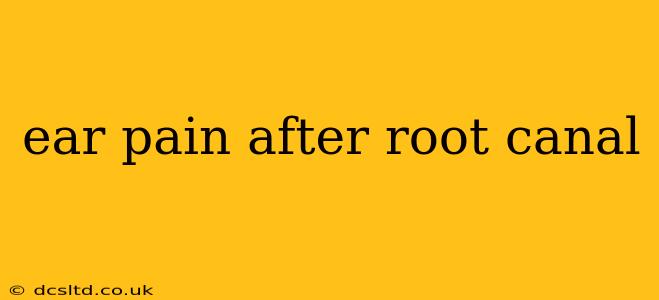Experiencing ear pain after a root canal is more common than you might think, even though the procedure focuses on the tooth's root and not directly on the ear. This often leaves patients confused and concerned. This comprehensive guide will delve into the possible causes of this discomfort, explain why it occurs, and provide insights into effective relief methods. We'll also address common questions surrounding this issue.
Why Does My Ear Hurt After a Root Canal?
The connection between your teeth and your ears might seem tenuous, but they're closely linked anatomically. The nerves and blood vessels in your jaw and face are intricately interwoven. Inflammation or irritation in one area can easily affect neighboring structures. Several factors contribute to post-root canal ear pain:
-
Referred Pain: This is the most likely culprit. Referred pain occurs when pain originating from one area is felt in another. The trigeminal nerve, a major nerve in the face, innervates both the teeth and the ear. Inflammation from the root canal procedure (even if successfully completed) can trigger pain signals along this nerve, causing the discomfort to be perceived in the ear.
-
Sinus Infection: Your sinuses are located close to your upper teeth. A root canal procedure, particularly on an upper molar, can sometimes exacerbate an existing sinus infection or trigger a new one. Sinus pressure can radiate to the ear, causing pain.
-
Infection: In rare cases, an infection might persist or develop after the root canal. If the infection spreads, it could potentially impact structures near the ear, leading to pain. This is usually accompanied by other symptoms like swelling and fever, making it easier to diagnose.
-
Jaw Muscle Tension: The procedure itself, along with any anxiety associated with it, might cause you to clench your jaw. This can lead to significant jaw muscle tension and pain that radiates to the ear.
-
Dry Socket (alveolar osteitis): Although not directly related to the ear, a dry socket (a painful complication after an extraction) can cause referred pain. This is rare if a root canal was performed, rather than an extraction.
What Should I Do if I Have Ear Pain After a Root Canal?
If you experience ear pain after a root canal, don't panic. Most instances are caused by referred pain and resolve themselves within a few days. However, it's crucial to:
-
Contact your dentist: This is the most important step. They can assess the situation, rule out serious complications, and recommend appropriate treatment.
-
Over-the-counter pain relievers: Ibuprofen or acetaminophen can help manage the pain. Always follow the recommended dosage.
-
Warm compress: Applying a warm compress to the affected area might soothe the pain and reduce inflammation.
-
Gentle jaw exercises: If jaw muscle tension is suspected, gentle jaw stretching and relaxing exercises can provide relief.
How Long Does Ear Pain After a Root Canal Last?
The duration of ear pain varies greatly depending on the underlying cause. For referred pain, it typically resolves within a few days to a week. However, if the pain persists for longer, intensifies, or is accompanied by other symptoms (like swelling, fever, or pus), it's crucial to seek immediate dental attention.
Is Ear Pain After a Root Canal a Sign of Failure?
Not necessarily. While persistent or severe pain could indicate a problem, many cases are unrelated to the root canal's success. Referred pain is a common phenomenon. However, prompt evaluation by your dentist is essential to ensure the root canal was successful and address any potential complications.
Can I Take Over-the-Counter Medications for Ear Pain After a Root Canal?
Over-the-counter pain relievers like ibuprofen (Advil, Motrin) or acetaminophen (Tylenol) can help manage the pain. However, it's crucial to consult your dentist before starting any medication, especially if you're already taking other medications. They can advise on the appropriate dosage and ensure there are no potential interactions.
When Should I Seek Emergency Dental Care?
Seek immediate dental attention if:
- The pain is severe and unbearable.
- The pain is accompanied by swelling, fever, or pus.
- You notice any signs of infection.
- The pain lasts for more than a week without improvement.
This information is for educational purposes only and does not constitute medical advice. Always consult with a qualified dental professional for diagnosis and treatment of any dental or medical condition.
